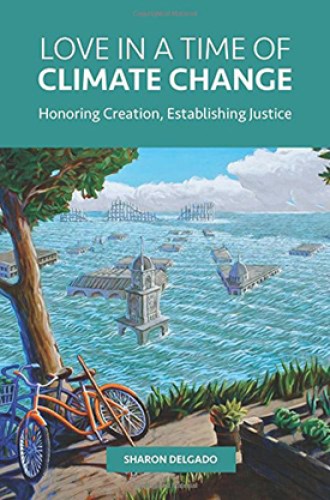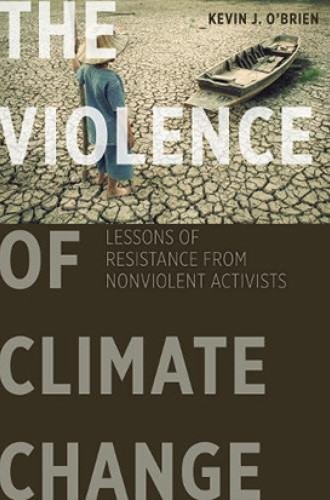How should Christians face climate change?
We've moved on from the question of whether we should care.
With the emergence of global climate change and widespread inaction in response, an important shift is happening in conversations about Christianity and the environment: a move from “Why should we care?” to “What are we to do?” Gone are the days in which Christian environmental thinkers were primarily concerned with trying to convince people to love the wider-than-human creation. Christians are turning toward more practical discernment. In Sharon Delgado’s words, the question is “How can we face these realities, discern their implications, emerge with our faith intact, and respond with words and actions that demonstrate God’s loving intentions for the world?”
Although climate change is seen as a new problem, many Christians are seeking resources from within the Christian tradition to help shape responses. As Kevin J. O’Brien writes, the “claim of uniqueness is very common in writing about climate change,” but “a movement for climate justice requires good news from the past in order to look with realistic hope into the future.” Faced with the potential of discontinuities caused by drastic climate change, Christians are turning toward inherited wisdom as sources of continuity in thought and practice.
For Delgado, a United Methodist minister and environmental activist, this turn to the Christian tradition involves using the Wesleyan quadrilateral as a means for discerning how one might live in love in a time of climate change. Wesley’s four interrelated sources of authority for moral and spiritual discernment—scripture, tradition, reason, and experience—guide Delgado’s reflections on what it means to honor creation and establish justice in today’s world. The less denominationally grounded O’Brien, who teaches Christian ethics at Pacific Lutheran University, turns to the tradition of nonviolent protest in the United States, engaging five Christian “witnesses” to glean lessons for responding to climate change: John Woolman, Jane Addams, Dorothy Day, Martin Luther King Jr., and Cesar Chavez. O’Brien argues that this tradition of “resisting violence while refusing to use violence” offers creative resources for thinking about how to respond to climate change precisely because the problem of climate change is one of structural violence, “caused indirectly by social systems” but still “a selfish expression of power that harms others.”
O’Brien provides a focused engagement with each of his five moral exemplars. He finds that each of them contributes a different lesson that can help shape our responses to climate change. Woolman provides a lesson about the power and limits of personal moral purification; Addams presents the importance of pragmatic engagement with institutions to make incremental change; Day shows the significance of a deep (not necessarily religious) faith in resisting climate change; King provides a lesson in hope, a responsible middle path between optimism and despair; and Chavez teaches us about the power of voluntary sacrifice on the part of the privileged to change the world.
O’Brien is at his strongest when he attends to the idiosyncrasies of his witnesses and their distinctive contributions to thinking about climate change. He is thoughtful and constrained, presenting clear connections and lessons for the reader. The project’s weakness, however, lies close to its strength. O’Brien is so careful in considering what he can and cannot claim that readers are sometimes left wondering about the significance of his claims. For example, he writes at one point:
I am not arguing that nonviolence is the only acceptable response . . . [nor that] all responses to climate change must be nonviolent . . . nor . . . that all nonviolence should be motivated by Christian faith . . . [nor that] all Christians must embrace nonviolence . . . instead, simply this: All who are concerned about climate change have something to learn from this.
Given these many caveats, readers are left asking: What is the normative status of the lesson O’Brien has just presented?
While O’Brien is careful, constrained, and concentrated, Delgado is wide-ranging. Because she focuses on two areas of inquiry (What does it mean to honor creation and to establish justice?) from four different angles (How do reason, scripture, experience, and tradition each contribute to answering these questions?) she covers a lot of ground. She discusses scriptural exegesis of Romans 8, an introduction to liberation thought, reflection on Wesley’s theology, arguments against creationism, and much more.
Because of its breadth, Delgado’s book could be useful as an introduction to the main conversations within Christian environmentalism. The weakness in such broad coverage is a diffuseness of the text and its argument, which makes it hard to find clear takeaways. However, Delgado’s use of Wesley in addressing climate change is novel and interesting. In particular, I found her reflection on the Wesleyan understanding of social holiness to be provocative in thinking about collective responsibility and action.
One problem currently facing environmental thinkers is the insufficient response of the most developed nations to climate change. Both Delgado and O’Brien are attentive to their social status as privileged actors who work in an economically and technologically advanced nation. They see their audiences as similar privileged actors who struggle with complicity while discerning how to live well. As O’Brien states, his book “is directed at privileged people in the industrialized world with relatively extensive resources, who bear guilt for and a responsibility to oppose the violence of climate change.” While Delgado sees her audience as people of faith, and particularly Christians, O’Brien has a wider set of privileged people in mind. He sees Christianity as one conversation partner, but he also seeks “inclusive conversation with people of diverse faiths and no faiths.”
Both within and outside of Christianity, the environmental movement is facing essential questions. How should we act in the face of climate change? How may the past help us in such undertakings? How might people of privilege repent of their complicity and seek justice for those who are the most marginalized? As we discern answers, both Delgado and O’Brien are welcome conversation partners.






